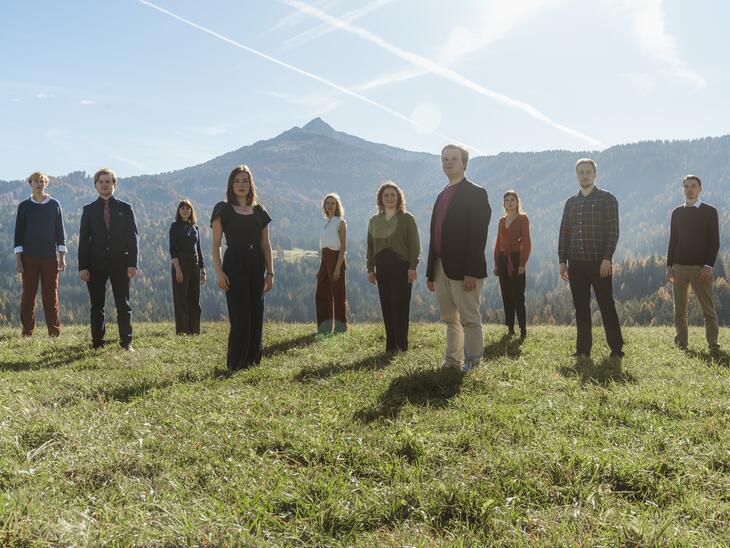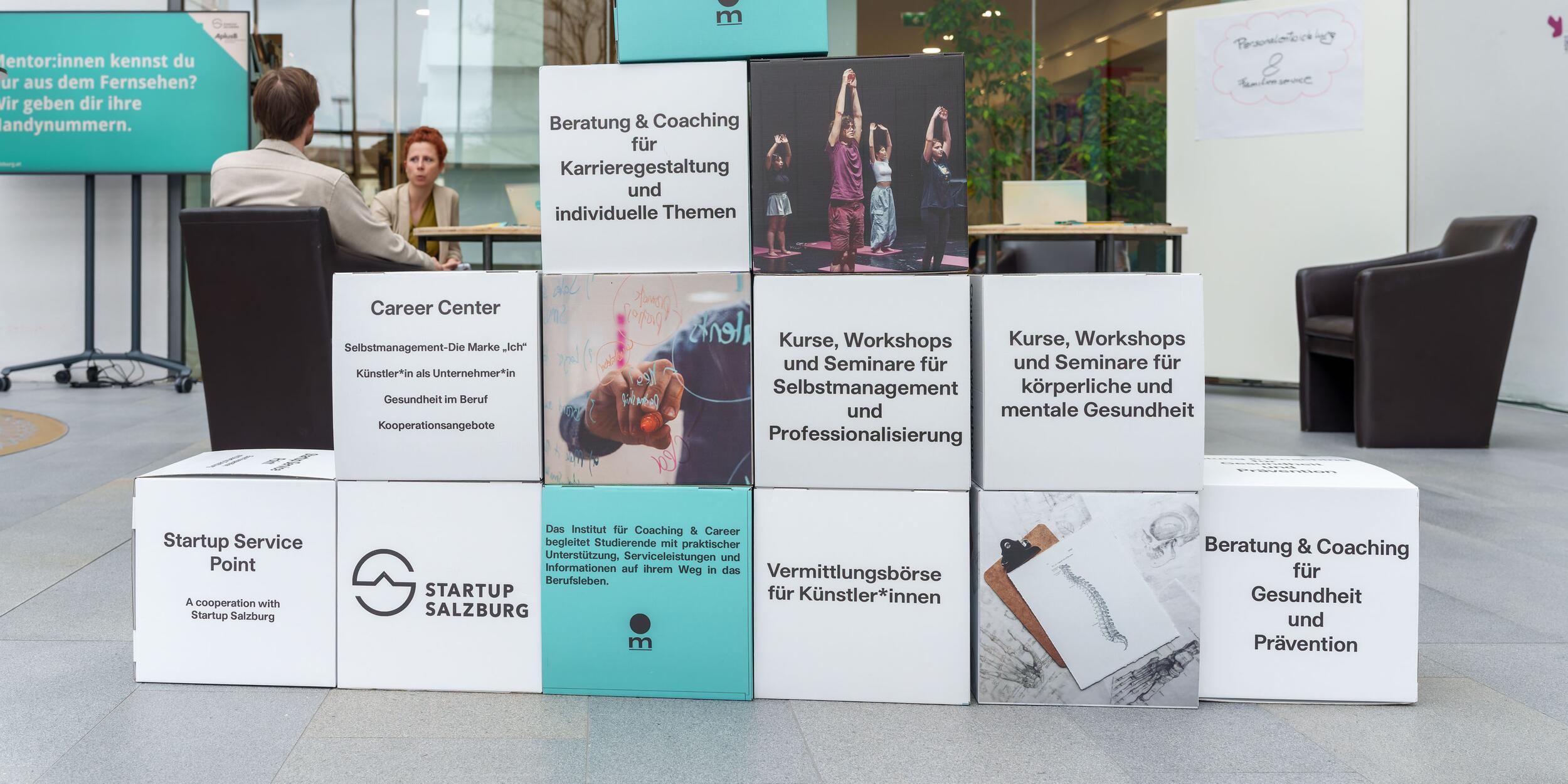
A conversation with Benedikt Gurtner about a cappella singing, working in an ensemble, the importance of music for children and society, and the social value of making music together.
International Mozart Competition - Piano: Livestream final & award ceremony on 19 February from 7 p.m.

Franziska Wallner, Head of the Institute for Coaching & Career at the Mozarteum University, on resilience, career and the changing shape of professional training for musicians.
Institute for Coaching & Career
+43 676 88122 380
career@moz.ac.at
What does the future hold for music education in Europe? At the annual congress ‘The Sound of Future Music Education: Leadership, Innovation and Wellbeing’ of the Association Européenne des Conservatoires, Académies de Musique et Musikhochschulen (AEC), hosted this year by the Mozarteum University Salzburg, Franziska Wallner, head of the Institute for Coaching & Career, will speak about stress management, self-direction and new competence profiles for artists. In an interview, she explains why resilience is much more than a short-term crisis strategy for her – and why traditional career paths are no longer sufficient for many young musicians.
What exactly does the Institute for Coaching & Career at the Mozarteum University offer?
The Institute for Coaching & Career has been in existence since 2023 and, like most institutes at the Mozarteum University, it works across disciplines, which means we offer various workshops, individual counselling, coaching and elective courses for students from all departments and disciplines. The focus is on career development, the acquisition of interdisciplinary skills, and physical and mental health. We have also set up a start-up and entrepreneurship service as well as a artist placement service.
Why does an Arts university need services such as these?
On the one hand, physical and mental health is a very relevant issue, and on the other hand, there are of course the challenges of the job market. This has changed significantly, so musicians have to be flexible in a different way and perhaps rethink their own expectations. Today's market depends on people being flexible in their orientation, very willing to experiment and prepared to work in an interdisciplinary manner. These are major challenges. That is why it is important to prepare students well for this, and the services offered could certainly be even more intensive. Talking about mental health is not yet as commonplace as it should be. It is also a sociological issue, e.g. what cultural backgrounds students come from and whether it is easy for them to express their emotions or admit that they may have insecurities in some areas. However, this is something that I think definitely needs to be talked about more in general, not just at arts universities.
You will be speaking at the AEC Congress on the topic of “Resilience: from stress management to skills for the future”. How do you define resilience in this context?
As I see it, resilience is not only about stress management, but also about self-awareness and how to assess one's own strengths, and awareness of one's own skills, which may go beyond technical mastery of one’s instrument. An important point for resilience in the arts and cultural sector is knowing one's own impact, one's own skills beyond technical competence and where they can be applied. Those who know their strengths and can use them flexibly can master upheavals with greater confidence and open up opportunities for new, flexible career paths beyond traditional careers. It requires a good balance between self-efficacy, the use of one's own skills and stress management strategies, as well as good mindfulness towards one's own health.
You will also provide insights into your research on transferable skills. What does that mean?
Primarily, it refers to interdisciplinary skills that can also be applied in other industries or for meeting the many and varied challenges we encounter professionally. For example, when you study music with us, you also learn a lot about cultural understanding, confidence in performing, dealing with stress and criticism, but also about social media marketing and self-management. All of this enables a broader professional portfolio. We know from various studies that people who are artistically active in the labour market usually have a ‘portfolio career’, i.e. they work in different professional fields.
Has students' awareness of this issue changed as well?
Many artists are now aware that you need a 360-degree profile these days. And I feel that the constant shift in values that our society is undergoing plays a major role in this. It is often no longer enough for artists to simply be part of an overall production. Instead, they want to make a real contribution to society – be it social, cultural or ecological. This need for self-efficacy and influence is very pronounced. Often, the goal is no longer to be employed in an orchestra for 40 hours a week. Instead, many want to work independently or freelance, to realise their personal potential, to have a good work-life balance and to work with content and values that fit their own artistic self-image.
The Institute for Coaching & Career regularly develops new programmes. How do you choose which programmes to offer, and what are your priorities?
The input for my work comes from several sources: from conversations with students and alumni and asking them what they need and what experiences they have had. I am also in close contact with information centres such as mica – music austria, which regularly highlight which workshops and programmes really strike a chord and attract a lot of registrations. I read a lot of studies and am currently conducting a study myself in which I ask freelance musicians in Austria how they are doing and what their working reality looks like. I am also active in various networks and regularly exchange ideas with colleagues from other universities. This exchange allows me to check whether we are on the right track with our programme or whether there are areas that need to be redrafted. Since I can develop a new programme every semester, our programme will hopefully always remain up to date and address topics that are particularly relevant at the moment.
What are your hopes for the future of musicians' education?
That health, resilience and self-management become just as natural as instrumental technique, interpretation or music theory. For me, artistic quality and personal stability are inextricably linked. And I would like to emphasise the role of networks: many students spend most of their time alone in their practice rooms, concentrating solely on their work. When you start your career after graduation, you often realise how many opportunities you missed to meet people and build relationships. Networking is essential for me because the musical world is actually very small. There is no ‘one’ cultural scene, but rather many small scenes where people know each other and recommend each other, and a lot of things happen through word of mouth. That's why I think any kind of event where you can meet, present yourself and stay in touch is extremely important. I consider formats such as the AEC, where you get a lot of input but can also exchange ideas with other music universities, to be central to your own development. Networks must be actively maintained. It is important to keep track of things and know who you can contact and where – otherwise you can quickly find yourself quite alone if you don't have an agent in the background.
What is your top tip for a good and mindful everyday life as a student?
Treat leisure time like working time – in other words, plan it consciously and don't cancel it. That sounds trivial, but it's one of the most effective strategies against overload. Breaks are not wasted time, but the basis for performance.
(Article published in the Uni-Nachrichten / Salzburger Nachrichten on 4th October 2025)